中式英语之鉴
中式英语之鉴理论
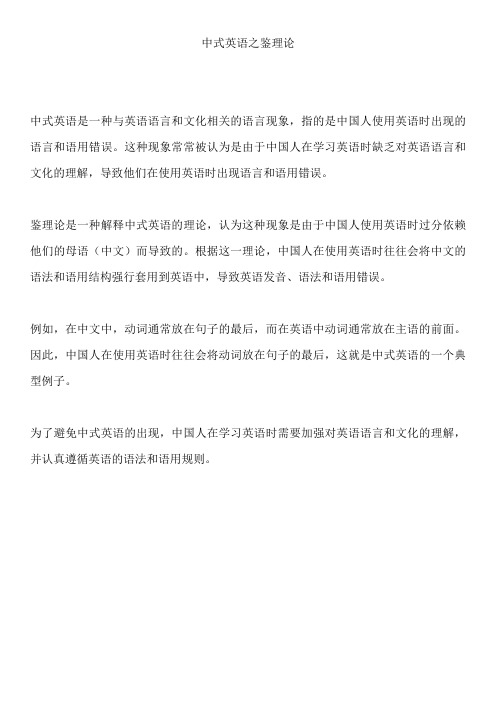
中式英语之鉴理论
中式英语是一种与英语语言和文化相关的语言现象,指的是中国人使用英语时出现的语言和语用错误。
这种现象常常被认为是由于中国人在学习英语时缺乏对英语语言和文化的理解,导致他们在使用英语时出现语言和语用错误。
鉴理论是一种解释中式英语的理论,认为这种现象是由于中国人使用英语时过分依赖他们的母语(中文)而导致的。
根据这一理论,中国人在使用英语时往往会将中文的语法和语用结构强行套用到英语中,导致英语发音、语法和语用错误。
例如,在中文中,动词通常放在句子的最后,而在英语中动词通常放在主语的前面。
因此,中国人在使用英语时往往会将动词放在句子的最后,这就是中式英语的一个典型例子。
为了避免中式英语的出现,中国人在学习英语时需要加强对英语语言和文化的理解,并认真遵循英语的语法和语用规则。
中式英语之鉴读书笔记(下)

中式英语之鉴读书笔记(下)本篇博客将继续上篇的内容,总结《中式英语之鉴》⼀书的剩余部分。
Part Two:句⼦结构上⼀部分是希望让⼀个英语句⼦变得简洁,本部分则是希望让句⼦变得清晰且有逻辑。
上⼀部分是雪中送炭,这⼀部分希望做到锦上添花。
因此,这⼀部分的错误将会⽐Part One 中的错误更难识别。
名词“瘟疫”臃肿晦涩的名词会如同「瘟疫」⼀般,影响、⼲扰、蔓延⾄整个句⼦的其他部分,从⽽使整个句⼦由于若⼲个使⽤不慎的名词变得沉闷。
⽽中式英语的⼀⼤特征就是,名词的使⽤⼗分臃肿⽽晦涩。
Part One中介绍过了冗余名词、⽆义名词与种类名词等,这些名词有时甚⾄会额外引⼊⼀些⽆意义的词,本章将主要介绍那些会对健康句⼦带来的「瘟疫」的抽象名词。
请谨慎使⽤抽象名词「具体」的名词要⽐「抽象」名词更清晰、更有⼒。
滥⽤抽象名词的句⼦The prolongation of the existence of this temple is due to the solidity of its construction.This temple has endured because it was solidly built原句中各个抽象名词的堆叠让整个句⼦都看起来⾮常别扭image packaging and impression managementdress to create a favorable impression解决⽅案可以将原有的抽象名词动词化,即直接写出来要做的事情即可,不必造作式地转换成名词叙述,例如:there can be no achievements in our workwe can achieve nothing将抽象名词换为动名词或者还可以将抽象名词换为动名词,这样可以将原有⽣硬晦涩的句⼦变得更有⽣机,⽽且使原来搭配的指向性更强。
economic revitalization will be an xxxrevitalizing the economy will be anbegan its issuance of xxissuing xxon agricultural reinforcementstrengthening agricultural还有⼀种⽅法是将抽象名词替换为对应的形容词或者副词,如下所⽰:for the unsoundness in organizationpoor organizationcorrectness of the policythe policy is correctAgainst blindness in actionagainst acting blindly添加宾语:有时可将抽象名词转化为其对应动词+(隐含的宾语),即将词的意思展开,使语义更加清晰明确。
中式英语之鉴全译本

中式英语之鉴全译本中式英语是指中国人在使用英语时,受到母语中文的影响,造成语法、词汇和表达方式不符合英语的规范。
《中式英语之鉴》是一本书籍,旨在总结和纠正中式英语的常见错误和问题。
以下是对《中式英语之鉴》的全译本的多角度全面回答:《中式英语之鉴》全译本是一本详细介绍中式英语问题的书籍,它从多个角度对中式英语进行了全面的分析和解读。
该书的目的是帮助读者理解中式英语的特点和常见错误,并提供正确的英语表达方式。
首先,该书从语法角度深入探讨了中式英语的问题。
它指出了中式英语中常见的语法错误,比如错误的时态使用、冠词和代词的错误搭配等。
通过详细的解释和例子,读者可以更好地理解英语语法的规范,并避免中式英语中常见的错误。
其次,该书从词汇角度解析了中式英语的特点。
它列举了中式英语中常见的词汇错误,比如直译、误用和歧义等。
通过对这些错误的解释和纠正,读者可以学会正确地选择和使用英语词汇,避免中式英语中常见的词汇错误。
此外,该书还从语言习惯和表达方式的角度分析了中式英语的问题。
它指出了中式英语中常见的表达方式不符合英语的习惯和规范,比如过度使用被动语态、使用繁琐的句子结构等。
通过对这些问题的解释和示例,读者可以更好地掌握英语的表达方式,避免中式英语中常见的表达问题。
此外,该书还提供了一些实用的技巧和建议,帮助读者纠正中式英语的问题。
它介绍了一些常用的英语学习资源和方法,以及如何培养良好的英语思维方式和习惯。
通过这些技巧和建议,读者可以更好地提高自己的英语水平,避免中式英语的陷阱。
总之,《中式英语之鉴》全译本是一本全面深入地解析中式英语问题的书籍。
它从语法、词汇、表达方式和学习方法等多个角度进行了全面的分析和解读。
通过阅读该书,读者可以更好地理解和纠正中式英语的问题,提高自己的英语水平。
中式英语之鉴笔记

中式英语之鉴笔记以下是一份中式英语之鉴笔记:一、中式英语的表现1、用词不当:中式英语常常在用词上出现偏差,使用不地道的表达方式。
例如,“I am very happy to help you.”应该翻译为“我很高兴能帮助你。
”而不是“我非常开心可以帮助你。
”。
2、语法错误:中式英语在语法方面常常出现错误,比如使用动词的不当形式,或是在句子的结构上出现问题。
例如,“Yesterday I went to the park and I saw a beautiful sunset.”应该翻译为“昨天我去了公园,看到了美丽的日落。
”而不是“昨天我去了公园我看到了美丽的日落。
”。
3、表达方式生硬:中式英语的表达方式常常显得生硬,不够流畅自然。
例如,“I like this book. It is very interesting.”应该翻译为“我喜欢这本书,它很有趣。
”而不是“我喜欢这本书,它很有趣吗?”二、如何避免中式英语1、多读多听:多读英文原著和新闻报道,多听英语音频和视频,可以提高英语语感和表达能力。
2、学习语法:学习英语语法规则和句型结构,可以帮助你正确地使用英语。
3、写作练习:通过写作练习可以锻炼你的英语表达能力和思维能力。
4、请外教指导:请外教指导你的英语表达,指出你的问题所在,可以帮助你纠正中式英语的错误。
三、中式英语之鉴示例1、“I very like English.”(错误)正确翻译:“I like English very much.”(正确)2、“She is beautiful than me.”(错误)正确翻译:“She is more beautiful than me.”(正确)3、“I have two books in my hand.”(错误)正确翻译:“I have two books in my hands.”(正确)总之,要避免中式英语的出现,需要不断的学习和实践。
中式英语之鉴书评
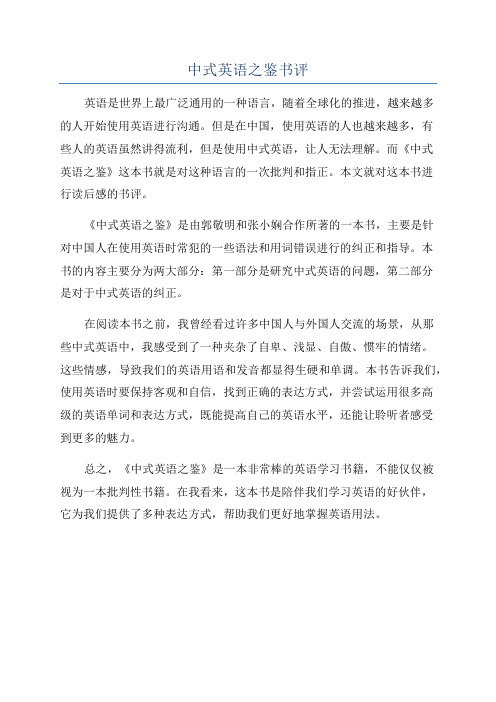
中式英语之鉴书评
英语是世界上最广泛通用的一种语言,随着全球化的推进,越来越多
的人开始使用英语进行沟通。
但是在中国,使用英语的人也越来越多,有
些人的英语虽然讲得流利,但是使用中式英语,让人无法理解。
而《中式
英语之鉴》这本书就是对这种语言的一次批判和指正。
本文就对这本书进
行读后感的书评。
《中式英语之鉴》是由郭敬明和张小娴合作所著的一本书,主要是针
对中国人在使用英语时常犯的一些语法和用词错误进行的纠正和指导。
本
书的内容主要分为两大部分:第一部分是研究中式英语的问题,第二部分
是对于中式英语的纠正。
在阅读本书之前,我曾经看过许多中国人与外国人交流的场景,从那
些中式英语中,我感受到了一种夹杂了自卑、浅显、自傲、惯牢的情绪。
这些情感,导致我们的英语用语和发音都显得生硬和单调。
本书告诉我们,使用英语时要保持客观和自信,找到正确的表达方式,并尝试运用很多高
级的英语单词和表达方式,既能提高自己的英语水平,还能让聆听者感受
到更多的魅力。
总之,《中式英语之鉴》是一本非常棒的英语学习书籍,不能仅仅被
视为一本批判性书籍。
在我看来,这本书是陪伴我们学习英语的好伙伴,
它为我们提供了多种表达方式,帮助我们更好地掌握英语用法。
中式英语之鉴阅读
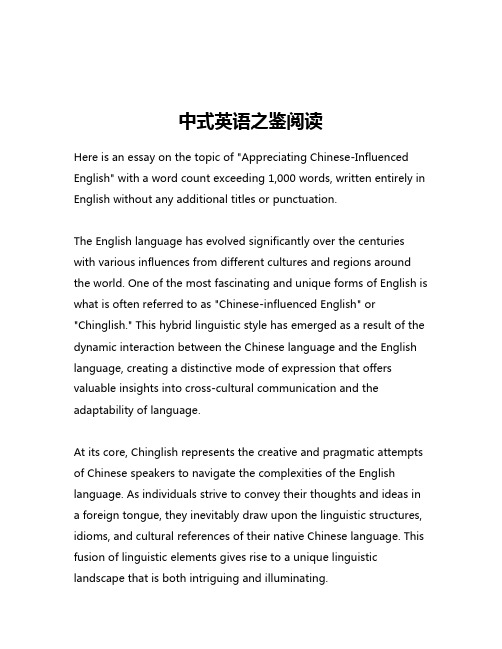
中式英语之鉴阅读Here is an essay on the topic of "Appreciating Chinese-Influenced English" with a word count exceeding 1,000 words, written entirely in English without any additional titles or punctuation.The English language has evolved significantly over the centuries with various influences from different cultures and regions around the world. One of the most fascinating and unique forms of English is what is often referred to as "Chinese-influenced English" or "Chinglish." This hybrid linguistic style has emerged as a result of the dynamic interaction between the Chinese language and the English language, creating a distinctive mode of expression that offers valuable insights into cross-cultural communication and the adaptability of language.At its core, Chinglish represents the creative and pragmatic attempts of Chinese speakers to navigate the complexities of the English language. As individuals strive to convey their thoughts and ideas in a foreign tongue, they inevitably draw upon the linguistic structures, idioms, and cultural references of their native Chinese language. This fusion of linguistic elements gives rise to a unique linguistic landscape that is both intriguing and illuminating.One of the most prominent features of Chinglish is the direct translation of Chinese idioms and expressions into English. This process, known as "literal translation," often results in phrases that may seem nonsensical or humorous to native English speakers, but which carry profound meaning and cultural significance in the Chinese context. For instance, the Chinglish phrase "the old man under the tree" might be a direct translation of the Chinese idiom "树下老人," which refers to a wise and experienced individual who imparts valuable knowledge and guidance. Similarly, the expression "to add oil" in Chinglish is a literal translation of the Chinese phrase "加油," which is used to encourage and motivate others. These linguistic quirks not only highlight the differences between the two languages but also offer a glimpse into the unique worldviews and cultural perspectives of Chinese speakers.Moreover, Chinglish often reflects the influence of Chinese grammatical structures on the usage of English. Chinese is a language that is characterized by its conciseness and the omission of certain grammatical elements, such as articles and pronouns. When Chinese speakers translate these linguistic features directly into English, the result can be sentences that appear incomplete or unconventional to native English speakers. For example, the Chinglish phrase "I go to school" might be a direct translation of the Chinese sentence "我去上学," where the pronoun "I" and the article"the" are omitted. While this construction may seem unnatural in standard English, it reflects the underlying logic and linguistic patterns of the Chinese language.Interestingly, Chinglish also showcases the creative and adaptive nature of language. As Chinese speakers grapple with the challenges of expressing themselves in English, they often develop novel ways of using words and phrases that defy the conventional norms of the language. This linguistic creativity can be seen in the coining of new terms, the repurposing of existing words, and the blending of Chinese and English elements. For instance, the term "self-service" in Chinglish might be used to refer to a situation where an individual is expected to take care of their own needs, rather than relying on the assistance of others. This innovative usage of the term "self-service" reflects the practical and resourceful mindset of Chinese speakers as they navigate the linguistic landscape of English.Furthermore, Chinglish can be seen as a testament to the resilience and adaptability of the English language. As it encounters and assimilates influences from diverse cultural and linguistic backgrounds, English demonstrates its remarkable capacity to evolve and accommodate new forms of expression. The emergence of Chinglish not only enriches the global tapestry of English but also highlights the language's ability to serve as a medium for cross-cultural exchange and understanding.In the realm of business and international communication, Chinglish can play a crucial role in bridging cultural divides and facilitating effective dialogue. As Chinese companies and individuals engage with the global marketplace, their use of Chinglish can provide valuable insights into their thought processes, cultural references, and communication styles. By understanding and appreciating the nuances of Chinglish, native English speakers can cultivate a deeper appreciation for the cultural context and perspectives of their Chinese counterparts, ultimately leading to more productive and meaningful exchanges.Moreover, the study of Chinglish can offer valuable lessons in language learning and intercultural communication. By examining the patterns and mechanisms underlying Chinglish, linguists and educators can gain valuable insights into the challenges and strategies employed by language learners. This knowledge can inform the development of more effective language teaching methodologies and materials, helping to bridge the gap between the Chinese and English languages and fostering greater cross-cultural understanding.In conclusion, the phenomenon of Chinglish is a fascinating and multifaceted aspect of the English language. It represents the creative and adaptive efforts of Chinese speakers to navigate thelinguistic landscape of English, while also reflecting the rich cultural heritage and unique perspectives of the Chinese language. By appreciating and studying Chinglish, we can gain a deeper understanding of the dynamic interplay between language and culture, and the remarkable resilience and adaptability of the English language as it continues to evolve and embrace diverse influences from around the world.。
《中式英语之鉴》-笔记
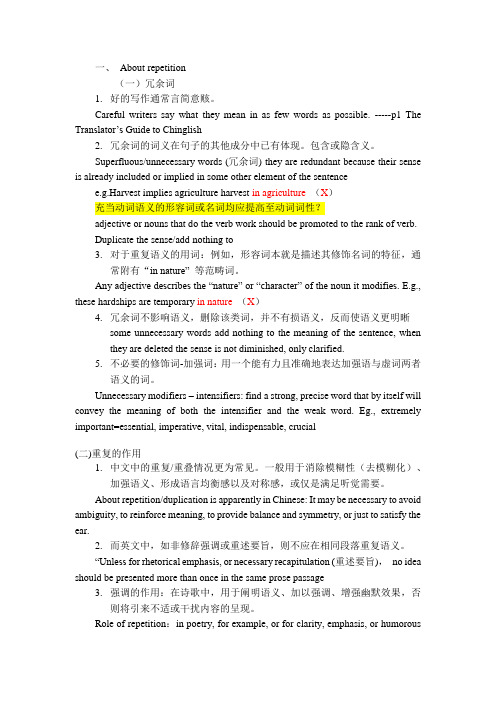
一、About repetition(一)冗余词1.好的写作通常言简意赅。
Careful writers say what they mean in as few words as possible. -----p1 The Translator’s Guide to Chinglish2.冗余词的词义在句子的其他成分中已有体现。
包含或隐含义。
Superfluous/unnecessary words (冗余词) they are redundant because their sense is already included or implied in some other element of the sentencee.g.Harvest implies agriculture harvest in agriculture (X)充当动词语义的形容词或名词均应提高至动词词性?adjective or nouns that do the verb work should be promoted to the rank of verb.Duplicate the sense/add nothing to3.对于重复语义的用词:例如,形容词本就是描述其修饰名词的特征,通常附有“in nature” 等范畴词。
A ny adjective describes the “nature” or “character” of the noun it modifies. E.g., these hardships are temporary in nature(X)4.冗余词不影响语义,删除该类词,并不有损语义,反而使语义更明晰some unnecessary words add nothing to the meaning of the sentence, whenthey are deleted the sense is not diminished, only clarified.5.不必要的修饰词-加强词:用一个能有力且准确地表达加强语与虚词两者语义的词。
10中式英语之鉴
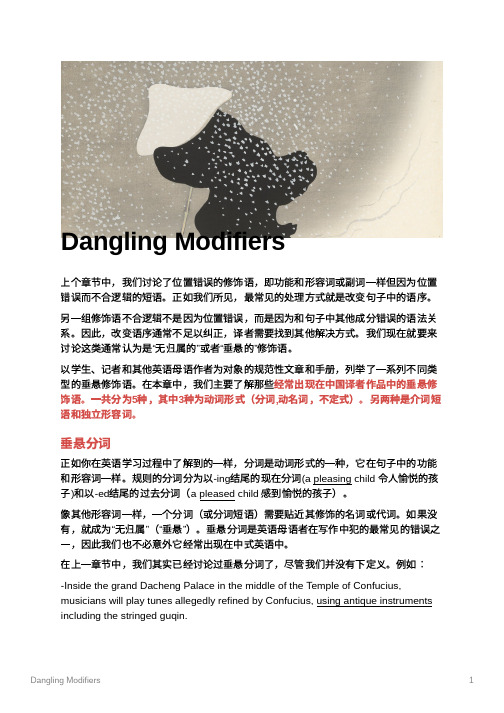
Dangling Modifiers上个章节中,我们讨论了位置错误的修饰语,即功能和形容词或副词⼀样但因为位置错误⽽不合逻辑的短语。
正如我们所⻅,最常⻅的处理⽅式就是改变句⼦中的语序。
另⼀组修饰语不合逻辑不是因为位置错误,⽽是因为和句⼦中其他成分错误的语法关系。
因此,改变语序通常不⾜以纠正,译者需要找到其他解决⽅式。
我们现在就要来讨论这类通常认为是“⽆归属的”或者“垂悬的”修饰语。
以学⽣、记者和其他英语⺟语作者为对象的规范性⽂章和⼿册,列举了⼀系列不同类型的垂悬修饰语。
在本章中,我们主要了解那些经常出现在中国译者作品中的垂悬修饰语。
⼀共分为5种,其中3种为动词形式(分词,动名词,不定式)。
另两种是介词短语和独⽴形容词。
垂悬分词正如你在英语学习过程中了解到的⼀样,分词是动词形式的⼀种,它在句⼦中的功能和形容词⼀样。
规则的分词分为以-ing结尾的现在分词(a pleasing child 令⼈愉悦的孩⼦)和以-ed结尾的过去分词(a pleased child 感到愉悦的孩⼦)。
像其他形容词⼀样,⼀个分词(或分词短语)需要贴近其修饰的名词或代词。
如果没有,就成为“⽆归属”(“垂悬”)。
垂悬分词是英语⺟语者在写作中犯的最常⻅的错误之⼀,因此我们也不必意外它经常出现在中式英语中。
在上⼀章节中,我们其实已经讨论过垂悬分词了,尽管我们并没有下定义。
例如:-Inside the grand Dacheng Palace in the middle of the Temple of Confucius, musicians will play tunes allegedly refined by Confucius, using antique instruments including the stringed guqin.在这个句⼦中,本⽤于修饰“musicians”的分词短语反⽽更贴近前⾯的名词“Confucius”。
- 1、下载文档前请自行甄别文档内容的完整性,平台不提供额外的编辑、内容补充、找答案等附加服务。
- 2、"仅部分预览"的文档,不可在线预览部分如存在完整性等问题,可反馈申请退款(可完整预览的文档不适用该条件!)。
- 3、如文档侵犯您的权益,请联系客服反馈,我们会尽快为您处理(人工客服工作时间:9:00-18:30)。
abroad, and it is quite important to create suitable conditions for their work after they come back.
Zhao’s images are somewhat primitively aggressive,
1.
A: to bring about a change in this state of affairs B: to change this state of affairs
Most examples in passive voice
A: approval should be given to all these projects B: all these projects should be approved A: grain rationing was implemented B: grain was rationed
Discuss
‘MAKE’ phrase
To make an investigation of to investigate To make a decision to to decide to To make efforts to to try (or attempt to) To make an analysis of to analyze
grain and cotton… If not, what is the function of the word ‘appropriately’?
3. Intensifiers
A Intensifiers with weak words Poor vocabulary Extremely important Essential, imperative, vital, indispensable, crucial Absolutely wanted to Were determined to, had resolved to, were bent on,
expenditure The solution is to curtail expenditure
Category Nouns
Ex. A: reform in the sphere of the economy B: reforms in the economy (or: economic reforms) A: to ensure a relationship of close cooperation between… B: to ensure close cooperation between…
A: these practices should be totally abolished
B: these practices should be abolished
Common redundant intensifiers Active/actively active efforts should be made to… (efforts are active by definition) Effective/effectively To benefit the people by means of an effective control
I. Unnecessary Nouns and Verbs
Unnecessary Nouns
Redundant—the sense is already included or implied
in some other element of the sentence
Ex.
A: to accelerate the pace of economic reform B: to accelerate economic reform (‘To accelerate’= ‘to increase the pace of’)
A serious of All sorts of various kinds of What about ‘强调’?
Other examples
A: imports of foreign automobiles have declined
sharply this year B: imports of automobiles have declined sharply th Nhomakorabeas year
A: that theory too is a valuable ideological treasure of
the Party B: that theory too is an ideological treasure of the Party
A: the Chinese government took all possible
II. Unnecessary Modifiers
1. Redundant Modifiers
Obvious Redundancies
mutual cooperation residential housing advance forecasts a serious natural disaster female businesswoman
A: they must also have some necessary knowledge
about history and geography B: the must also know something about history and geography
Self=evident modifiers
class struggle B: we used to overemphasize the need for class struggle
Various (Discuss) In English the plural is shown by the form of noun
ending in ‘–s’ ‘Various’ is usually superfluous
2. Unnec. V.+ N. + third word (N.) Ex. A: our troops used the method of slow advance B: our troops advanced slowly A: we adopted the policy of withdrawal B: we withdrew A: this measure will have a restrictive effect on the activities of speculators B: this measure will restrict the activities of speculators
Overworked introductory verb phrases
Discuss
A: It is especially necessary to make great efforts to assimilate the achievements of other cultures. B: It is especially necessary to assimilate the achievements of other cultures Variants: make every effort to; try our best to; do our utmost to; do everything possible to Plain verbs: strive to endeavor to word hard to
Ex. (Discuss) A: these nine years constitute a period in which the
national economic strength has increased The economy = national economy?
We should appropriately raise the purchasing prices of
Unnecessary Verbs
In Chinglish, most unnecessary verbs occur in phrases.
Unnec. V.+ N. A: they should conduct a careful examination of… B: they should carefully examine…
electrification of agriculture B: following the mechanization and electrification of agriculture
A: the key to the solution lies in the curtailment of
eventualities into account when it made this policy decision B: the Chinese government took all eventualities into account when it made this policy decision
Qualifiers
Adverbs designed to lesson the force of statement. Rather, quite, relatively Misuse opposite effect
Ex.
We have dozens of thousands of students studying
Adverbs of time (Discuss)
A: now the government is working hard to improve
